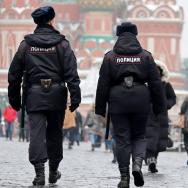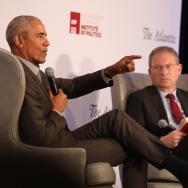Why does poverty, violence and crime exist? And what are the events and interventions that lead people in and out? These are the types of questions that fascinate University of Chicago scholar Christopher Blattman.
An economist and political scientist, Blattman conducts field studies, surveys, natural experiments, and field experiments in sub-Saharan Africa, Latin America, and Chicago.
The Ramalee E. Pearson Professor of Global Conflict Studies at the Harris School of Public Policy, Blattman also has been a business consultant and accountant, and spent two years as a cook at what he calls “a vaguely militant KFC outlet.” But he maintains that his best jobs were rock-climbing instructor and music store salesman.
Now Blattman can add another item to his eclectic CV: On April 19, his new book, Why We Fight: The Roots of War and the Paths to Peace, hits bookshelves.
The book draws from decades of real-world interventions and research in economics, political science and psychology, as seen through the lens of Blattman’s research. Publishers Weekly calls it “a stimulating discussion of violence” that “illuminates a fraught subject with sober reason.” In its pages, Blattman notes that millions of hostile rivalries are simmering across the world. Only a fraction become violent—and for only five reasons.
The question to ask, Blattman writes, is this: Why couldn’t opponents compromise? Peace, he adds, often occurs through tinkering, not transformation. He discusses these questions in the following Q&A, edited from a recent conversation.
Why write this book and why now?
I always wanted to write it. Then, one day back in June 2017, someone who was interviewing me about this subject for a podcast asked, “Are you ever going to write about this?” I said, “Well, one day I’ll write a book.” And he said, “Well, I'm kind of old. And I'd really like to read that book. Why don't you start now?” I signed off and started writing that day.
In a way, I had been waiting for somebody else to write it. There are all these ideas that are fundamental to how social scientists—especially someone who does political economics like me—think about conflict that are totally revolutionary. Thinking about everything from marital disputes all the way up to great power conflict, some general principles exist for understanding conflict that are really useful and powerful. Unfortunately, nobody talks about them outside the academic sphere.
A couple of these insights are mine but many of them are a gift from decades of research by thousands of people. Because I'm an economist by training and because of the University of Chicago, I'm not supposed to believe that there are $100 bills laying on the sidewalk. But these insights do feel like $100 bills laying on the sidewalk.
These are complex ideas. And maybe that's why they weren't translated for a more general audience. I like doing that translation work. So, I decided to do it.
The timing of the book’s release has a grim relevance. What, if anything, do you make of the book’s relevance to Russia’s invasion of Ukraine?
It's easy to forget in these moments that conflict was not foreordained. There was a way to avoid it, and there's still a way to wind it down. And most of the time, that's what happens.
One could look at this and say, “Oh, we live in a violent world.” But in fact, China went from an economic backwater to the largest economy in the world quite rapidly without conflict with the West. And Russia fell, rose, fell, and rose again, without a conflict with the West.
Until now, Russia has leveraged its power over most of its near neighbors relatively peacefully. You might not like the fact that a regime with a different ideology, with a different economy, with authoritarian government, is leveraging its influence, just like they don't like the fact that America has been leveraging its influence. But it's been happening with relatively few lives lost. So, part of the book’s purpose is to help people put this in perspective and to realize that war is the exception rather than the rule.
In the book, you offer five reasons, or “logics,” to explain why we fight. How do those logics, which you frame as stories, help us understand why tensions between Russia and Ukraine turned violent?
There are actually only so many logical ways that violence usually happens, and the Russian invasion fits into most of those.
Start with the fact that Ukraine is a small country with few close allies and its economy has stagnated more than any in the region for decades—not exactly a recipe for getting what you want in this world. Meanwhile, its nearest neighbor has been rolling in oil and gas riches, growing stronger. Its leader has been consolidating his personal political control. Russia also managed, either through Europe's naivete or something more insidious, to get Western Europe to become energy dependent on Russia.
So, Russia has accumulated a huge amount of leverage over Ukraine and the West, and Russia wanted to use that leverage in its interest. It tried to do that by every means possible—propaganda, assassinations, supporting separatists—and when that failed, they had one last threat: invasion.
Now, fighting is costly enough that a lot of the time, people don't fight. But Putin ignored those costs for a couple of reasons.
One reason is what I call unchecked interests. Putin is a personalist autocrat. He doesn't bear most of the costs. A second reason is Putin's nationalist ambitions. All signs point to him being willing to pay enormous costs to carve off territory and eliminate the possibility of Ukrainian democratic example on his border. This gave him both strategic and ideological incentives to invade despite the horrific costs.
Meanwhile, we have to ask why Ukraine decided to fight back. Ukraine is weaker than Russia and the Ukrainians were given an imperial bargain that, most times, people in that position accept, even if it's simply by standing down and letting the tanks roll in.
But the Ukrainians said no way. They refused, out of outrage and idealism. You might call it noble intransigence. In the context of the book, I call it an intangible incentive: that simple cost-benefit calculus says the Ukrainians should accept a bargain, where they must compromise on sovereignty, but they didn’t accept it because that compromise was abhorrent. They said, in effect, "We value this other thing called liberty so much that we’re unwilling to trade. In fact, we’re willing to trade some death and destruction to preserve it."
That’s not what normally happens. By the way, Americans like this story because that’s the choice Americans made in their revolution. Other reasons from the book—uncertainty and misperceptions—apply as well. Uncertainty, in that the uncertainty between Russia and Ukraine was difficult to resolve; and misperception in that Putin, who may have his own personal incentives, may have misperceived the circumstances he thought he understood.
So, that’s how the book applies here. I think it helps us understand why Russia was willing to make this terrible ask of Ukraine, and why Ukraine was willing to fight. The book is a way of almost organizing the mess—all the millions of stories we hear about war—into a set of simple, coherent explanations for why the normal bargain wasn’t struck. That, I think, enables people to make their own judgment about what’s going on.
—This is an excerpt from a story first published by the Harris School of Public Policy. Read the full Q&A, or learn more from Blattman’s recent Reddit AMA.

